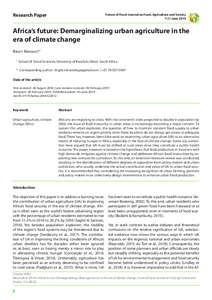Datum
2018-06-05Autor
Nkrumah, BrightSchlagwort
630 Landwirtschaft, VeterinärmedizinMetadata
Zur Langanzeige
Aufsatz

Africa’s future: Demarginalizing urban agriculture in the era of climate change
Zusammenfassung
Africans are migrating to cities. With the continent’s cities projected to double in population by 2050, the issue of food insecurity in urban areas is increasingly becoming a major concern. To sustain this urban explosion, the question of how to maintain constant food supply to urban residents remains an urgent priority since these locations do not always get access to adequate food. There has, however, been little work on examining urban agriculture (UA) as an alternative means of reducing hunger in Africa, especially in the face of climate change. Some city authorities have argued that UA must be shifted to rural areas since they constitute a public health nuisance. The paper, however, is based on the hypothesis that food production in locations with high demands mitigates against climate change and addresses Africa’s food insecurities by exploiting new avenues for cultivation. To this end, an extensive literature review was conducted, resulting in the identification of different degrees of opposition from policy-makers and urban authorities, who usually underrate the actual contribution and value of UA to urban food security. It is recommended that considering the increasing recognition of urban farming, planners and policymakers must collectively design interventions to enhance urban food production.
Zitierform
In: Future of Food: Journal on Food, Agriculture and Society Vol. 7 / No. 1 (2018-06-05) , S. 8-20 ; ISSN 2197-411XSammlung(en)
Vol 07, No 1 (2019) (Future of Food: Journal on Food, Agriculture & Society // The Future of Food Journal: Journal on Food, Agriculture & Society)Zitieren
@article{doi:10.17170/kobra-2018122072,
author={Nkrumah, Bright},
title={Africa’s future: Demarginalizing urban agriculture in the era of climate change},
journal={Future of Food: Journal on Food, Agriculture and Society},
year={2018}
}
0500 Oax 0501 Text $btxt$2rdacontent 0502 Computermedien $bc$2rdacarrier 1100 2018$n2018 1500 1/eng 2050 ##0##http://hdl.handle.net/123456789/11263 3000 Nkrumah, Bright 4000 Africa’s future: Demarginalizing urban agriculture in the era of climate change / Nkrumah, Bright 4030 4060 Online-Ressource 4085 ##0##=u http://nbn-resolving.de/http://hdl.handle.net/123456789/11263=x R 4204 \$dAufsatz 4170 7136 ##0##http://hdl.handle.net/123456789/11263
<resource xsi:schemaLocation="http://datacite.org/schema/kernel-2.2 http://schema.datacite.org/meta/kernel-2.2/metadata.xsd"> 2019-06-14T12:54:47Z 2019-06-14T12:54:47Z 2018-06-05 doi:10.17170/kobra-2018122072 http://hdl.handle.net/123456789/11263 eng Section Specialized Partnerships in Sustainable Food Systems and Food Sovereignty at the University of Kassel, Germany and Federation of German Scientists (VDW) Urheberrechtlich geschützt https://rightsstatements.org/page/InC/1.0/ Urban agriculture climate change Africa 630 Africa’s future: Demarginalizing urban agriculture in the era of climate change Aufsatz Africans are migrating to cities. With the continent’s cities projected to double in population by 2050, the issue of food insecurity in urban areas is increasingly becoming a major concern. To sustain this urban explosion, the question of how to maintain constant food supply to urban residents remains an urgent priority since these locations do not always get access to adequate food. There has, however, been little work on examining urban agriculture (UA) as an alternative means of reducing hunger in Africa, especially in the face of climate change. Some city authorities have argued that UA must be shifted to rural areas since they constitute a public health nuisance. The paper, however, is based on the hypothesis that food production in locations with high demands mitigates against climate change and addresses Africa’s food insecurities by exploiting new avenues for cultivation. To this end, an extensive literature review was conducted, resulting in the identification of different degrees of opposition from policy-makers and urban authorities, who usually underrate the actual contribution and value of UA to urban food security. It is recommended that considering the increasing recognition of urban farming, planners and policymakers must collectively design interventions to enhance urban food production. open access Nkrumah, Bright publishedVersion ISSN 2197-411X No. 1 Future of Food: Journal on Food, Agriculture and Society 8-20 Vol. 7 </resource>
Die folgenden Lizenzbestimmungen sind mit dieser Ressource verbunden:
Urheberrechtlich geschützt

